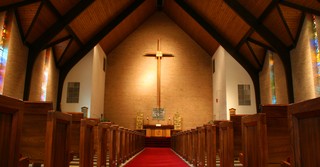What Happens When Christians Don't Know Ecclesiology?
Share

Recently, the tragedy of an imploded submersible carrying five passengers to the sunken Titanic has grabbed the attention of people all over the world.
What went wrong? One thing was clear from the beginning: the vessel was unfit for the job.
Complaining that regulations were holding back their ability to innovate and therefore attract and serve more excited individuals, the company involved in the incident cut corners. It strayed from the authoritative body of knowledge. The passengers knew nothing of these potential pitfalls. They were simply along for the ride. And then, the ship imploded. Five lives were lost in the carnage. As a result, tourism to the Titanic will undoubtedly take a hit.
This is why people need to know about ecclesiology, the study of the church. Churches often find themselves in trouble. The very thing meant to be a picture of unity as it functions as Christ’s body, how more people are to fall in love with Christ, the church, is experiencing implosion. The wreckage is wounding people. Potential travelers are turning away from what they see as risk outweighing the reward. To know what went wrong, we must be informed passengers who know the authoritative body of knowledge regarding the church (God’s Word) so that we don’t put our lives in the hands of ships doomed to fail from the start.
What Part of Theology Does Ecclesiology Study?
Ecclesiology is the study of the church. The church—not a building, not a Sunday morning service, but the gathering of Spirit-filled individuals to worship their Creator and spread His good news.
Ecclesiology filters through all modern conceptions of what “church” means and examines the Biblical mandates for what comprises the ekklésia, the congregation of Christ’s followers, the “called out ones.”
The study of ecclesiology examines what exactly ‘church’ meant to Christ, what it should mean to His followers, and how it should function in the world.
What Kind of Questions Does Ecclesiology Explore?
The first question to explore is, “What exactly is the church?”
Is it the building that you go to on a Sunday morning? Is it a specific denomination?
Ephesians 1:22-23 answers the question.
“And God placed all things under his feet and appointed him to be head over everything for the church, which is his body, the fullness of him who fills everything in every way.”
The church is evidently Christ’s body. First Corinthians 12:13 explains that Christ’s body is everyone that has put their hope in Christ’s work on the cross:
“For in one Spirit we were all baptized into one body—Jews or Greeks, slaves or free—and all were made to drink of one Spirit.”
The universal church is Christ’s followers in every place throughout all time.
We tend to equate the word “church” with local expressions of the church—individual congregations. We find local churches throughout Scripture. In his introduction to his letter to the Galatians, Paul writes, “. . . and all the brothers with me, to the churches of Galatia” (Galatia 1:2). To the Corinthian believers, Paul writes, “to the church of God that is in Corinth, to those sanctified in Christ Jesus, called to be saints together with all those who in every place call upon the name of our Lord Jesus Christ, both their Lord and ours. . . ” (1 Corinthians 1:2).
The inevitable next question is, “What should local churches’ defining characteristics be?” Some may be surprised that clever sermons, Sunday school classes, coffee, and awesome worship bands nowhere appear in Scripture. Sadly, in too many modern American churches, God’s non-negotiables have been replaced with our non-negotiables. The primary things have become secondary, and the secondary have become primary. Few would stay in a church that lacked familiar comforts. Still, many happily attend churches that fail to “visit orphans and widows in their affliction” (James 1:27), prioritize church discipline for the sake of the holiness of Christ’s body (Matt. 18:17), meet together for prayer (Matt. 18:20), break bread together, see people come to know the Lord (Acts 2:42-27), or love one another as Christ has loved us (John 15:12).
After considering what defines a church, ecclesiology outlines proper church governance. Scripture lays out a local church starting with Christ as the head (Eph. 1:22), elders as overseers, and deacons as “servant leaders.”
Qualifications for elders and deacons are laid out in 1 Timothy 3:2-8. Beyond these descriptions, Scripture does not define church structure, hence the various denominational structures.
While there is room for many church structures, the structure does matter. A helpful concept when evaluating church government is “heretical structures.” John Stott coined this term in The Living Church, encouraging Christians to ask what theology a church’s structure communicates and whether it aligns with Scripture.
As Tim Chester and Steve Timmins elaborated in their book Total Church, “the theology that matters is not the theology we profess but the theology we practice.” An example of this could be a church that professes concern for orphans and widows, but its structure prioritizes self-preservation rather than human transformation.
What Are Some Important Reasons to Study Ecclesiology?
The church can be all that Christ has called it to be. Limits set by human ability are surpassed where the Spirit of God is present. Lives can be transformed. Hearts can be renewed. The miraculous workings of our Holy God can be witnessed when the church functions as it is meant to.
We must study ecclesiology to know what that looks like—to have a vision for what the church can and should be. In doing so, we avoid our tendency to get comfortable, assuming that what we see is all possible.
The health and vitality of God’s children and the church’s witness to the world depend on proper ecclesiology. Insofar as we ignore what concerns Christ most regarding His church, it will prove itself impotent. But as believers faithfully live out Scripture’s mandates regarding the church, it becomes the light it is meant to be.
We must ask ourselves whether our meeting and worship are pleasing to God. There are many instances in Scripture where people meet at God’s altar, and it fails to please Him. In fact, it is often an offense to Him, a burden that He does not desire to bear for long (Mal. 1:10-11, Is. 1:11-13, Jer. 14:12). We must evaluate our church body to ensure we are not falling into the pitfalls that displeased the Lord before.
Sadly, churches have hurt many people—through rejection, gossip, abuse scandals, or various other sins. To witness to hurt people, we must understand the difference between the church as God defines it and the church as most people understand it today. Knowing the difference can help them separate their vision of Christ from what happened to them in the building or by the people that claimed to be His witness.
Lastly, the study of ecclesiology is crucial for missionary work. Church meetings will look different in diverse cultures with varying customs. Thus, missionaries must know Biblical ecclesiology to avoid putting laws on a church body that stem from tradition, not Biblical application.
What Happens When We Don’t Study Ecclesiology?
When we do not study ecclesiology, the church becomes what we want it to be, not what God wants it to be. Its effectiveness is inhibited. Our spiritual growth is stunted. We are at risk of being passengers on a flawed submersible, unaware of the flaws in the design.
Even if a church is not at risk of implosion, its ability to fulfill Christ’s glorious vision for His church will be hampered if its leaders and congregants are unaware of all that Scripture says concerning ecclesiology. A human-envisioned institution will always fall short of one grounded in God’s ideals and supported by His Holy Spirit.
How Can We Start Learning Ecclesiology?
If we want to know what God thinks about His church, what it is, and what it should look like, then we must go to His Word. A helpful place to begin studying ecclesiology from Scripture is to do a word study on the term ekklésia. Search for all of the times that it is used in Scripture and study those passages that reference the church explicitly.
But do not stop there. The Bible often discusses Christ’s body without specifically using the term “church.” When reading the New Testament, notice the times it does and use such descriptions. As you do, you will continually build a more complete view of the church as it should be.
Many men and women have done the work of studying ecclesiology in depth, have real-world experiences applying what they learned, and have recorded it all in books. These works can be invaluable in helping to point us to passages in Scripture that we may have looked past on our own and to affirm through testimony the fruitfulness of trusting in God’s vision of the church. For further reading, I would suggest starting with:
- Letters to the Church by Francis Chan
- Total Church: A Radical Reshaping Around Gospel and Community by Tim Chester & Steve Timmins
- The Church of Christ: A Biblical Theology For Today by Everett Ferguson
Photo Credit: © Getty/deviousrlm
